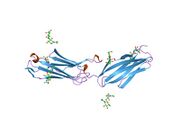Biology:ICAM2
 Generic protein structure example |
Intercellular adhesion molecule 2 (ICAM2), also known as CD102 (Cluster of Differentiation 102), is a human gene, and the protein resulting from it.
Protein structure
The protein encoded by this gene is a member of the intercellular adhesion molecule (ICAM) family. All ICAM proteins are type I transmembrane glycoproteins, contain 2–9 immunoglobulin-like C2-type domains, and bind to the leukocyte adhesion LFA-1 protein.
Protein functions
ICAM-2 molecules regulate spermatid adhesion on Sertoli cell on the apical side of the blood-testis barrier (towards the lumen), thus playing a major role in spermatogenesis.[1]
This protein may also play a role in lymphocyte recirculation by blocking LFA-1-dependent cell adhesion. It mediates adhesive interactions important for antigen-specific immune response, NK-cell mediated clearance, lymphocyte recirculation, and other cellular interactions important for immune response and surveillance.[2]
Interactions
ICAM2 has been shown to interact with EZR.[3] It has also been shown to bind to P9 (Uniprot: B2UM07), a secreted protein from Akkermansia muciniphila.[4]
See also
References
- ↑ "Intercellular adhesion molecules (ICAMs) and spermatogenesis". Human Reproduction Update 19 (2): 167–86. 2013. doi:10.1093/humupd/dms049. PMID 23287428.
- ↑ "Entrez Gene: ICAM2 intercellular adhesion molecule 2". https://www.ncbi.nlm.nih.gov/sites/entrez?Db=gene&Cmd=ShowDetailView&TermToSearch=3384.
- ↑ "Association of ezrin with intercellular adhesion molecule-1 and -2 (ICAM-1 and ICAM-2). Regulation by phosphatidylinositol 4, 5-bisphosphate". The Journal of Biological Chemistry 273 (34): 21893–900. August 1998. doi:10.1074/jbc.273.34.21893. PMID 9705328.
- ↑ "Akkermansia muciniphila secretes a glucagon-like peptide-1-inducing protein that improves glucose homeostasis and ameliorates metabolic disease in mice". Nature Microbiology 6 (5): 563–573. May 2021. doi:10.1038/s41564-021-00880-5. PMID 33820962.
Further reading
- "The role of ICAM expression in immunity and disease". Cancer Surveys 24: 141–55. 1995. PMID 7553659.
- "The intercellular adhesion molecule (ICAM) family of proteins. New members and novel functions". Immunologic Research 17 (3): 313–27. 1998. doi:10.1007/BF02786454. PMID 9638475.
- "Recruitment of lymphocytes to the human liver". Immunology and Cell Biology 80 (1): 52–64. February 2002. doi:10.1046/j.1440-1711.2002.01062.x. PMID 11869363.
- "Targeting leukocyte integrins in human diseases". Journal of Leukocyte Biology 77 (2): 129–40. February 2005. doi:10.1189/jlb.0804460. PMID 15548573.
- "Characterization of ICAM-2 and evidence for a third counter-receptor for LFA-1". The Journal of Experimental Medicine 174 (1): 253–67. July 1991. doi:10.1084/jem.174.1.253. PMID 1676048.
- "The human ICAM2 gene maps to 17q23-25". Genomics 11 (2): 462–4. October 1991. doi:10.1016/0888-7543(91)90157-A. PMID 1769660.
- "Functional cloning of ICAM-2, a cell adhesion ligand for LFA-1 homologous to ICAM-1". Nature 339 (6219): 61–4. May 1989. doi:10.1038/339061a0. PMID 2497351. Bibcode: 1989Natur.339...61S.
- "Expression of human intercellular adhesion molecules in middle ear cholesteatoma". American Journal of Otolaryngology 15 (4): 271–5. 1994. doi:10.1016/0196-0709(94)90094-9. PMID 7526720.
- "Characterization of the function of intercellular adhesion molecule (ICAM)-3 and comparison with ICAM-1 and ICAM-2 in immune responses". The Journal of Experimental Medicine 179 (2): 619–29. February 1994. doi:10.1084/jem.179.2.619. PMID 7905020.
- "Intercellular adhesion molecules (ICAM)-1 ICAM-2 and ICAM-3 function as counter-receptors for lymphocyte function-associated molecule 1 in human immunodeficiency virus-mediated syncytia formation". European Journal of Immunology 24 (9): 2191–5. September 1994. doi:10.1002/eji.1830240939. PMID 7916296.
- "Oligo-capping: a simple method to replace the cap structure of eukaryotic mRNAs with oligoribonucleotides". Gene 138 (1–2): 171–4. January 1994. doi:10.1016/0378-1119(94)90802-8. PMID 8125298.
- "Regulation mechanism of ERM (ezrin/radixin/moesin) protein/plasma membrane association: possible involvement of phosphatidylinositol turnover and Rho-dependent signaling pathway". The Journal of Cell Biology 135 (1): 37–51. October 1996. doi:10.1083/jcb.135.1.37. PMID 8858161.
- "Beta 2-integrin/intercellular adhesion molecule (ICAM) expression in the normal human intestine". Clinical and Experimental Immunology 106 (1): 160–9. October 1996. PMID 8870715.
- "Normalization and subtraction: two approaches to facilitate gene discovery". Genome Research 6 (9): 791–806. September 1996. doi:10.1101/gr.6.9.791. PMID 8889548.
- "Crystal structure of ICAM-2 reveals a distinctive integrin recognition surface". Nature 387 (6630): 312–5. May 1997. doi:10.1038/387312a0. PMID 9153399. Bibcode: 1997Natur.387..312C.
- "Construction and characterization of a full length-enriched and a 5'-end-enriched cDNA library". Gene 200 (1–2): 149–56. October 1997. doi:10.1016/S0378-1119(97)00411-3. PMID 9373149.
- "Neurofibromatosis 2 tumor suppressor protein colocalizes with ezrin and CD44 and associates with actin-containing cytoskeleton". Journal of Cell Science. 110 110 (18): 2249–60. September 1997. doi:10.1242/jcs.110.18.2249. PMID 9378774.
- "Ezrin/radixin/moesin (ERM) proteins bind to a positively charged amino acid cluster in the juxta-membrane cytoplasmic domain of CD44, CD43, and ICAM-2". The Journal of Cell Biology 140 (4): 885–95. February 1998. doi:10.1083/jcb.140.4.885. PMID 9472040.
- "Beta2 integrin/ICAM expression in Crohn's disease". Clinical Immunology and Immunopathology 86 (2): 147–60. February 1998. doi:10.1006/clin.1997.4462. PMID 9473377.
External links
- ICAM2+protein,+human at the US National Library of Medicine Medical Subject Headings (MeSH)
- PDBe-KB provides an overview of all the structure information available in the PDB for Human Intercellular adhesion molecule 2 (ICAM2)
This article incorporates text from the United States National Library of Medicine, which is in the public domain.
 |


